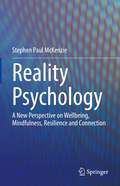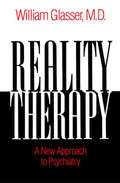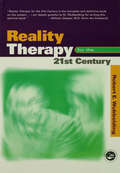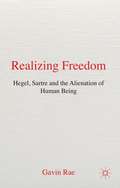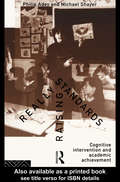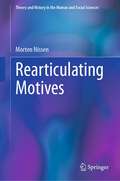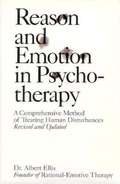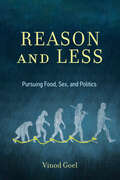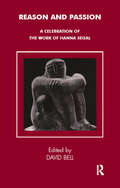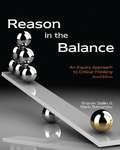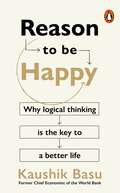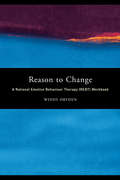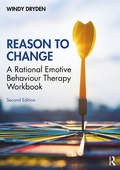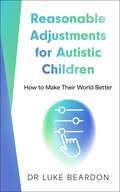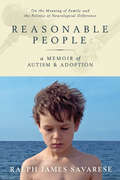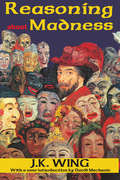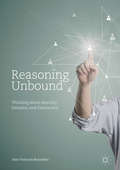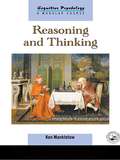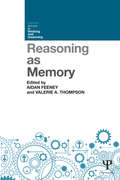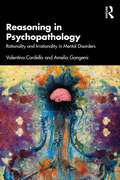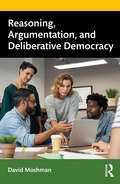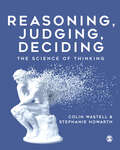- Table View
- List View
Reality Psychology: A New Perspective on Wellbeing, Mindfulness, Resilience and Connection
by Stephen Paul McKenzieThis book provides an introduction to and a dynamic description of a new psychological paradigm that balances the excesses and distortions of the positive psychology paradigm. It offers valuable theoretical and practical content to its readers on the vital need for, nature of and potential for the reality psychology paradigm. It includes concrete steps for this new paradigm to restore the real power of vital psychological knowledge and techniques, which need to be brought back from their association with artificial positivity. This will provide real human benefits, including real mindfulness, real resilience, real behaviour change, and real communication. The book features a presentation of the underlying principles of reality psychology – including the value of a full connection with reality as it really is - rather than as we would like it to be. This will help people thrive in response to as well as survive our great real-life challenges, by developing a deeply practical understanding of reality psychology knowledge and related practice techniques.The book provides considerable theoretical and practical benefits to students of a variety of psychological courses, including positive psychology related courses, and also of many other wellbeing related courses. The book also provides valuable benefits to non-student readers – expert and non-expert.
Reality Therapy
by William GlasserGlasser's classic bestseller, with more than 500,000 copies sold, examines his alternative to Freudian psychoanalytic procedures, explains the procedure, contrasts it to conventional treatment, and describes different individual cases in which it was successful.
Reality Therapy
by William GlasserGlasser's classic bestseller, with more than 500,000 copies sold, examines his alternative to Freudian psychoanalytic procedures, explains the procedure, contrasts it to conventional treatment, and describes different individual cases in which it was successful.
Reality Therapy For the 21st Century
by Robert E. WubboldingThis text is a comprehensive, practical, clearly illustrated examination of reality therapy. It includes an historically significant interview with William Glasser, MD, multicultural applications and research based studies. Its goal is to enhance the skills of helpers so that clients may live a more effective life through a total balance of love, health, and happiness. To help teach reality therapy, the author encapsulates the delivery system into the acronym "WDEP". It is expanded to include 22 types of self-evaluation which counsellors and therapists can use to shorten therapy time in the current managed care environment. Each component of the delivery system is illustrated with dialogues so that the reader can see exactly how the system is practical and immediately usable.
Realizing Freedom: Hegel, Sartre, and the Alienation of Human Being
by Gavin RaeA first in English, this book engages with the ways in which Hegel and Sartre answer the difficult questions: What is it to be human? What place do we have in the world? How should we live? What can we be?
Really Raising Standards: Cognitive intervention and academic achievement
by Philip Adey Dr Michael Shayer MICHAEL ShayerWritten by experienced teachers and educational researchers Phillip Adey and Michael Shayer, Really Raising Standards analyses attempts to teach children to think more effectively and efficiently. Their practical advice on how to improve children's performance by the application of the findings of the CASE research project will radically alter the approach of many professional teachers and student teachers as to the education of children in schools. An important contribution to the application of psychological theory in education.
Rearticulating Motives (Theory and History in the Human and Social Sciences)
by Morten NissenThis book presents a theory of motives that has evolved over decades in dialogue with academics and with practitioners. The key proposal is that of collectively cultivating meta-motives – rather than the ubiquitous recipes for manipulating self-regulation. Cultivating meta-motives can proceed through rearticulating motives. Such rearticulation engages with theories and practices of motivation and motives. First, this is a discussion of the psychologies of motivation, and a reflection of post-psychology as a way forward. Second, this discussion takes us back to fundamental problems with subjectivity, and with psychology, even critical psychology, as a way of addressing it. Third, out of this theoretical work come concepts that are put to work in understanding practices of modelling and cultivating motives – clinical, social work, and educational practices. In the first instance, as a critique of contemporary pragmatic practices, and then by rearticulating aesthetic practices as ways to expand and overcome those. Fourth, this has implications for the cultivation of the competence in care for motives, and for the place of theory in this competence. The book provides both a theoretical argument and a resource for those professionals in education, social work, and health who seek a qualitative understanding of what they do.
Reason and Emotion in Psychotherapy: A Comprehensive Method of Treating Human Disturbances, Revised and Updated
by Albert Ellis[from inside flaps] "Reason and Emotion in Psychotherapy, a seminal work in twentieth-century psychology, was the first book on rational-emotive therapy. Written for psychotherapists, it soon became one of the most important and most quoted books in the field. Although intended for professionals, it has since become a widely popular and indispensable self-help book. This updated and revised edition reflects new findings by Dr. Albert Ellis and his colleagues. Reason and Emotion in Psychotherapy started the cognitive-behavior movement in psychotherapy. When Dr. Ellis began practicing this groundbreaking new therapy in 1955, his was a little-heard voice. Two main forms of psychotherapy, both passive, then dominated the field: Freudian psychoanalysis, with its interminable listening to troubled people's complaints and supposedly unraveling their unconscious "complexes" and purportedly healing them of childhood traumas; and Carl Rogers's client-centered therapy, which forbade therapists from using any active-directive techniques to show clients what really troubled them or what to do about it. Other forms of therapy, such as Adlerian, Gestalt, Jungian, and behavior therapy, existed but had few followers. Reason and Emotion in Psychotherapy helped change all this. Including Dr. Ellis's major papers, it was the pioneering work in cognitive-behavior therapy and presented a revolutionary, powerful, brief, and effective psychological treatment that was deeper and more intensive than either psychoanalysis or the therapy of Rogers and his followers. Dr. Ellis's new approach caught the imagination of practitioners all over the world, and by the late 1960s he was joined by Aaron Beck, William Glasser, Donald Meichenbaum, and a host of other therapists who primarily followed his theories and practices. By the 1970s, Rational-Emotive Behavior Therapy (REBT) and cognitive-behavior therapy were supported by scores of experimental studies and were being used by innumerable mental health practitioners. Today, REBT continues to be increasingly popular and effective. Reason and Emotion in Psychotherapy helped so many therapists and laypeople over the years that a new edition might have seemed unnecessary. But psychotherapy, including REBT, moves on, and Dr. Ellis has expanded his original theory and practice and has added a large number of cognitive, emotive, and behavioral techniques to its innovative multimodal approach. This revised edition therefore includes all the important original theories and practices, as well as a significant number of corrections and changes derived from clinical experience and experimentation, featuring a revision of its famous ABC's on human neurosis. A great many of the therapeutic techniques have been perfected since 1955, and the teachings of unconditional self-acceptance (USA) have been updated."
Reason and Less: Pursuing Food, Sex, and Politics
by Vinod GoelA new, biologically driven model of human behavior in which reason is tethered to the evolutionarily older autonomic, instinctive, and associative systems. In Reason and Less, Vinod Goel explains the workings of the tethered mind. Reason does not float on top of our biology but is tethered to evolutionarily older autonomic, instinctive, and associative systems. After describing the conceptual and neuroanatomical basis of each system, Goel shows how they interact to generate a blended response. Goel&’s commonsense account drives human behavior back into the biology, where it belongs, and provides a richer set of tools for understanding how we pursue food, sex, and politics. Goel takes the reader on a journey through psychology (cognitive, behavioral, developmental, and evolutionary), neuroscience, philosophy, ethology, economics, and political science to explain the workings of the tethered mind. One key insight that holds everything together is that feelings—generated in old, widely conserved brain stem structures—are evolution&’s solution to initiating and selecting all behaviors, and provide the common currency for the different systems to interact. Reason is as much about feelings as are lust and the taste of chocolate cake. All systems contribute to behavior and the overall control structure is one that maximizes pleasure and minimizes displeasure. Tethered rationality has some sobering and challenging implications for such real-world human behaviors as climate change denial, Trumpism, racism, or sexism. They cannot be changed simply by targeting beliefs but will require more drastic measures, the nature of which depends on the specific behavior in question. Having an accurate model of human behavior is the crucial first step.
Reason and Passion: A Celebration of the Work of Hanna Segal (Tavistock Clinic Series)
by David BellThis book provides an account of Hanna Segal's contributions to psychoanalytic theory and practice and gives a picture of her as a person. It covers mainly on clinical and theoretical aspects of psychoanalysis.
Reason in the Balance: An Inquiry Approach to Critical Thinking
by Sharon Bailin Mark BattersbyReason in the Balance focuses broadly on the practice of critical inquiry, the process of carefully examining an issue in order to come to a reasoned judgment. This text emphasizes the various aspects that go into the practice of inquiry, including identifying issues and relevant contexts, understanding competing cases, and making a comparative judgment. Distinctive Features of the Text are: Emphasis on applying critical thinking to complex issues with competing arguments; Inclusion of chapters on inquiry in specific contexts; Attention to the dialogical aspects of inquiry, including sample dialogues; Emphasis on the spirit of inquiry. The Second Edition Features: (i) updated examples and items of current interest (ii) new dialogues on vaccination, prostitution, and climate change (iii) new material on biases in reasoning, including emotional and psychological, social, and cognitive biases (iv) material on deduction and formal logic supplemented with Appendix on Logic on the Web site, including links for further learning and practice.
Reason to Be Happy: Why logical thinking is the key to a better life
by Kaushik Basu'Reason to Be Happy is a wise and witty book that shows how thinking clearly can help us find happiness in our daily lives, get more of what we want, and even make the world a better place' Hannah FryWhy do our friends have more friends than we do? How do you book the best available seats on a plane? And if jogging for ten minutes adds eight minutes to our life expectancy, should we still go jogging?The ability to reason is one of our most undervalued skills. In everyday life, the key is to put yourself in the shoes of a clever competitor and think about how they might respond. Whether you are dealing with events on the scale of the Cuban missile crisis or letting go of anger, leading economist Professor Kaushik Basu shows how game theory - the logic of social situations - can help us achieve better outcomes and lasting happiness.Full of fascinating thought experiments and puzzles, Reason to Be Happy is a paean to the power of rationality. If you want to have a good life and even make the world a better place, you can start by thinking clearly.
Reason to Change: A Rational Emotive Behaviour Therapy (REBT) Workbook
by Windy DrydenRational Emotive Behaviour Therapy (REBT) is an approach to counselling and psychotherapy in which great emphasis is placed on how emotional problems can be caused by the role of thoughts, beliefs and behaviour. However, no book before has taught the skills needed to use this therapeutic approach in practice in a thorough and accessible way.Reason to Change is the first workbook which teaches the practical skills of REBT. Each skill is explained in detail, and examples are given of how each skill can be put into practice. These skills include:* developing a problem list and setting goals* choosing a target problem and assessing a specific example* questioning beliefs* dealing with your doubts, reservations and objections * taking action.By using these skills in an active way, it can be possible to overcome emotional problems such as anxiety, depression, shame, guilt, hurt, unhealthy anger, unhealthy jealousy and unhealthy envy. This book can be used by people on their own, and by those who are consulting an REBT therapist. It will also be of interest to therapists and counsellors.
Reason to Change: A Rational Emotive Behaviour Therapy Workbook 2nd edition
by Windy DrydenRational Emotive Behaviour Therapy (REBT) is an approach to counselling and psychotherapy in which great emphasis is placed on how attitudes are at the root of emotional problems and their solution. The first edition of Reason to Change was written as a one-of-a-kind workbook teaching the practical skills of REBT. In this updated edition, Windy Dryden teaches, in a very specific way, the skills needed to use this therapeutic approach in practice in a thorough and accessible way. Each skill is explained in detail, and examples are given of how each skill can be put into practice. These skills include: developing a problem list and setting goals choosing a target problem and assessing a specific example examining attitudes dealing with your doubts, reservations and objections taking action. By using these skills in an active way, it can be possible to address effectively emotional problems such as anxiety, depression, shame, guilt, hurt, unhealthy anger, unhealthy jealousy and unhealthy envy. This book can be used by people on their own, and by those who are consulting an REBT therapist. It will also be of interest to therapists and counsellors.
Reasonable Adjustments for Autistic Children: How to Make Their World Better
by Luke BeardonAutism acceptance has led to - at least, at surface level - an increased understanding of what autistic children need, and of what they find difficult to cope with. But is the world really making the kind of adjustments that would see your child truly thrive?In Reasonable Adjustments for Autistic Children acclaimed and much-loved author and expert Dr Luke Beardon sets out the full scope of what he sees as the essential adjustments we need to make to our homes, our schools and the wider world in order to allow our autistic young people to reach their full potential and be genuinely comfortable in each and every environment. From school uniform to train journeys and playdates, from dentists' surgeries to holiday resorts, Luke's book offers practical measures for adapting every environment or sensory situation. Absolutely essential reading for every parent of an autistic child, family member, caregiver, teacher or health and social care worker, this is a long-overdue book that has the potential to change the world for neurodiverse children, and for the children of generations to come.
Reasonable Adjustments for Autistic Children: How to Make Their World Better
by Luke BeardonAutism acceptance has led to - at least, at surface level - an increased understanding of what autistic children need, and of what they find difficult to cope with. But is the world really making the kind of adjustments that would see your child truly thrive?In Reasonable Adjustments for Autistic Children acclaimed and much-loved author and expert Dr Luke Beardon sets out the full scope of what he sees as the essential adjustments we need to make to our homes, our schools and the wider world in order to allow our autistic young people to reach their full potential and be genuinely comfortable in each and every environment. From school uniform to train journeys and playdates, from dentists' surgeries to holiday resorts, Luke's book offers practical measures for adapting every environment or sensory situation. Absolutely essential reading for every parent of an autistic child, family member, caregiver, teacher or health and social care worker, this is a long-overdue book that has the potential to change the world for neurodiverse children, and for the children of generations to come.
Reasonable People: A Memoir of Autism and Adoption
by Ralph James SavareseWatch an interview with DJ on CNNListen to Ralph Savarese's interview on NPR's "The Diane Rehm Show"Visit the book's website: www.reasonable-people.com"Why would someone adopt a badly abused, nonspeaking, six-year-old from foster care?" So the author was asked at the outset of his adoption-as-a-first-resort adventure. Part love story, part political manifesto about "living with conviction in a cynical time," the memoir traces the development of DJ, a boy written off as profoundly retarded and now, six years later, earning all "A's" at a regular school. Neither a typical saga of autism nor simply a challenge to expert opinion, Reasonable People illuminates the belated emergence of a self in language. And it does so using DJ's own words, expressed through the once discredited but now resurgent technique of facilitated communication. In this emotional page-turner, DJ reconnects with the sister from whom he was separated, begins to type independently, and explores his experience of disability, poverty, abandonment, and sexual abuse. "Try to remember my life," he says on his talking computer, and remember he does in the most extraordinarily perceptive and lyrical way.Asking difficult questions about the nature of family, the demise of social obligation, and the meaning of neurological difference, Savarese argues for a reasonable commitment to human possibility and caring.
Reasoning About Madness
by J. K. WingThe exact definition of "madness" remains elusive. There are difficulties in distinguishing the criminal from the mad or, more euphemistically, the mentally ill. Controversy has centered on the frightening potential possessed by the state to deprive of his rights the individual officially classified as mad.In this book, Wing, a psychiatrist of international repute, argues for a limited medical definition of mental illness, although he explains how even a doctor's professional judgment may often be influenced by social pressures. He compares concepts of madness prevalent in different types of society, examining, for example, the Marxist attitude towards the deviant in a socialist state. In a chapter which draws much from his own experience, he shows precisely how the apparatus of state medicine is used to suppress political dissidence in Russia. He also critically reviews the petty tyrannies prevalent in the West and tackles the difficult analytical problem of schizophrenia, a subject on which he is one of the most respected medical authorities.Reasoning about Madness is an original and important work in which the author successfully resists the temptation to erect "grand theories that explain nothing because they attempt to explain everything." Instead, he concentrates on developing a definition of madness which strikes a balance between the benefits of medical care and the preservation of human liberties.
Reasoning Unbound: Thinking about Morality, Delusion and Democracy
by Jean-François BonnefonThis book argues that the science of reasoning will prove most useful if focused on studying what human reasoning does best - understanding people. Bonnefon argues that humanity's unique reasoning abilities developed in order to handle the complexities of cooperative social life. Accordingly, human beings became exquisite students of the minds of other people to predict the kind of decisions they make, and assess their character. In particular, this volume explores the inferences humans make about the moral character of others, how they delude themselves about their own moral character, and the ways in which they can see through the delusions of others. In conclusion, the book considers how to leverage the power of human reasoning in order to sustain democratic life. This work will interest scholars and students working in fields including theory of mind, decision-making, moral cognition, critical thinking, experimental philosophy, and behavioural economics, as well as policy makers interested in how reasoning impacts our political understanding.
Reasoning and Thinking
by K. I. ManktelowThis undergraduate textbook reviews psychological research in the major areas of reasoning and thinking: deduction, induction, hypothesis testing, probability judgement, and decision making. It also covers the major theoretical debates in each area, and devotes a chapter to one of the liveliest issues in the field: the question of human rationality. Central themes that recur throughout the book include not only rationality, but also the relation between normative theories such as logic, probability theory, and decision theory, and human performance, both in experiments and in the world outside the laboratory. No prior acquaintance with formal systems is assumed, and everyday examples are used throughout to illustrate technical and theoretical points.The book differs from others in the market firstly in the range of material covered: other tend to focus primarily on on either reasoning or thinking. It is also the first student-level text to survey an imporatant new theoretical perspective, the information-gain or rational analysis approach, and to review the rationality debate from the standpoint of psuchological research in a wide range of areas.
Reasoning as Memory (Current Issues in Thinking and Reasoning)
by Valerie A. Thompson Aidan FeeneyThere is a growing acknowledgement of the importance of integrating the study of reasoning with other areas of cognitive psychology. The purpose of this volume is to examine the extent to which we can further our understanding of reasoning by integrating findings, theories and paradigms in the field of memory. Reasoning as Memory consists of nine chapters that make explicit links between basic memory process, and reasoning and decision-making. The contributors address a number of key topics including: the relationship between semantic memory and reasoning the role of expert memory in reasoning recognition memory and induction working memory and reasoning metamemory in reasoning. In addition, the chapters provide broad coverage of the field of thinking, and invite the intriguing question of how much there is left to explain in the field of reasoning when one has extracted the variance due to memory. This book will be of great interest to advanced undergraduates, postgraduates and researchers interested in reasoning or decision making, and to researchers interested in the role played in cognition by a variety of memory processes.
Reasoning in Psychopathology: Rationality and Irrationality in Mental Disorders
by Valentina Cardella Amelia GangemiReasoning in Psychopathology adopts a pragmatic conception of reasoning, demonstrating how people with mental disorders develop characteristic strategies of reasoning depending on the particular disorder they have and the emotions they experience.The book argues that these strategies are perfectly rational, as the individuals are using reasoning as a tool at the service of their goals. Through the analysis of the typical reasoning styles of very different psychopathologies, from anxiety disorders to obsessive-compulsive disorder, from schizophrenia to depression and paranoia, the book argues that mental disorders can affect common sense, or social cognition, while rationality is usually preserved. Supported by recent research, the authors claim that people with mental disorders follow the same rules as healthy people, and that in some cases, when the specific topic of their disorder is at stake, they can be even more logical than healthy people.It is a must-read for all researchers and students of rationality from cognitive psychology, psychiatry, and philosophy backgrounds.
Reasoning, Argumentation, and Deliberative Democracy
by David MoshmanIn light of the latest research from cognitive and developmental psychology, this key text explores reasoning, rationality, and democracy, considering the unique nature of each and their relationship to each other. Broadening our understanding from the development of reasoning and rationality in individuals to encompass social considerations of argumentation and democracy, the book connects psychological literature to philosophy, law, political science, and educational policy. Based on psychological research, Moshman sets out a system of deliberative democracy that promotes collaborative reasoning, rational institutions such as science and law, education aimed at the promotion of rationality, and intellectual freedom for all. Also including the biological bases of logic, metacognition, and collaborative reasoning, Moshman argues that, despite systematic flaws in human reasoning, there are reasons for a cautiously optimistic assessment of the potential for human rationality and the prospects for democracy. Reasoning, Argumentation, and Deliberative Democracy will be essential reading for all researchers of thinking and reasoning from psychology, philosophy, and education.
Reasoning, Judging, Deciding: The Science of Thinking
by Colin Wastell Stephanie HowarthAre humans effective thinkers? How do we decide what is right? Can we avoid being duped by fake news? Thinking and Reasoning is the study of how humans think; exploring rationality, decision making and judgment within all contexts of life. With contemporary case studies and reflective questions to develop your understanding of key dilemmas, this book covers the fundamentals of the science behind thinking, reasoning, and decision-making, making it essential reading for any student of Thinking and Reasoning. From heuristic biases to the cognitive science of religion, and from artificial intelligence to conspiracy theories, Wastell & Howarth′s text clearly and comprehensibly introduces you to the core theories of thinking, leaving no stone unturned, before showing you how to apply theory to practice. ′The unique selling point of the book is the inclusion of current topics and recent developments, a very good structure and it approaches the field from a very wide angle.′
Reasoning, Judging, Deciding: The Science of Thinking
by Colin Wastell Stephanie HowarthAre humans effective thinkers? How do we decide what is right? Can we avoid being duped by fake news? Thinking and Reasoning is the study of how humans think; exploring rationality, decision making and judgment within all contexts of life. With contemporary case studies and reflective questions to develop your understanding of key dilemmas, this book covers the fundamentals of the science behind thinking, reasoning, and decision-making, making it essential reading for any student of Thinking and Reasoning. From heuristic biases to the cognitive science of religion, and from artificial intelligence to conspiracy theories, Wastell & Howarth′s text clearly and comprehensibly introduces you to the core theories of thinking, leaving no stone unturned, before showing you how to apply theory to practice. ′The unique selling point of the book is the inclusion of current topics and recent developments, a very good structure and it approaches the field from a very wide angle.′
